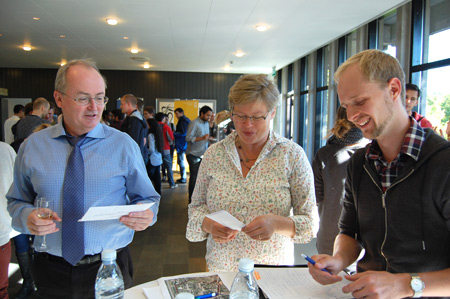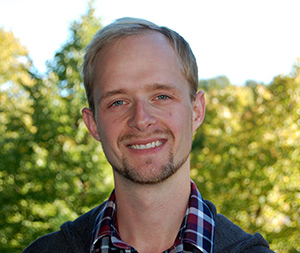Each month, new PhD students arrive at DTU from around the world. Twice a year, the newcomers are invited to participate in a welcome reception hosted by the PhD Office.
On 29 September, Martin P. Bendsøe, Senior Vice President and Dean of Graduate Studies and International Affairs, and Aase Grundtvig, Head of the PhD Office, bid welcome to 76 international and Danish PhD students.
The Dean stressed that the welcome reception was, first and foremost, a networking event and a unique opportunity to befriend people from all over the world:
“There are 1,500 other PhD students at DTU and more than half of they are international. So reach out to your colleagues at the whole of the University, not just your own department or research group. And remember to use your advisors. Although we call you PhD students, you are not really students anymore; Each and every one of you is a valued employee and an apprentice—learning from a master: your advisor.”
Plan your PhD
Three years go by so quickly, so the Dean encouraged the new PhD students to make sure they plan ahead and integrate their travels and stays abroad into their study plans.
“You might feel that the study plans and half year reports are necessary ‘evils’, but they are really meant to help and guide you. They are useful tools, and do remember that you can always change your plan along the way. Persevere even though you might struggle with learning how to do independent research, and please don’t hash over old ground: don’t waste time solving a problem that’s already been solved by someone else. There is a ton of expertise available to you at DTU—all you have to do is reach out!

From left to right: Dean Martin P. Bendsøe, Head of Office Aase Grundtvig and PhD student Stig Högberg
‘Mid-project Blues’
Martin Bendsøe cautioned the students to watch out for what he called the dreaded ‘Mid-project-Blues’, when things are not going fast enough or you feel stuck.
“But reach out to your colleagues and fellow PhD students and get help. And do take the time to experience the pressure and see if you can—or how you can—handle it. That experience will stand you in good stead later on.”
The Dean concluded by reminding the PhD fellows to have fun and wished them “joyful research”. He also urged them to use the Career Centre at DTU and to shop around at the annual DSE Fair where companies turn up to recruit talent.

Stig Högberg is in his final year at DTU. His address to the newcomers was all about planning:
“Don’t work 60 hours a week. The goal is not be become overworked, but to be efficient. Don’t panic if you can’t follow you plan, and don’t compensate by throwing in even more hours. Revise your plan instead!”
We talked to him later on where he was kind enough to answer a few questions:
Why did you choose DTU?
My parents tell the story of the four-year-old me, who had a burning desire to grow up to become an engineer and to attend DTU. Although this is quite true, I was certainly just as clueless as the next person when it came to figuring out how to go about it. I guess I’ve always been curious about electronics; I’ve always been fascinated by motors and permanent magnets and would spend hours working my way through discarded electronics. I even devoted most of my coursework during my master’s towards designing electrical machines. I graduated in 2012 and taught at the University College of Copenhagen (now DTU Ballerup) for a semester, before returning to DTU in 2013 to do my PhD in a research-project pertaining to the recycling of rare earth magnets from electrical machines.
What has been your experience of studying and working here?
Now, in the 3rd year of my studies, I’m more confident than ever that I’ve done the right thing by doing my PhD at DTU. DTU is obviously a technically sound and highly ranked university, but—equally important—it is a workplace with a sound attitude towards tailored needs and work methods. DTU scores very high in my book when it comes to acknowledging the importance of the vast amount of work performed by PhD students at the University.
Would you recommend it?
Yes, without any hesitation or doubt!
Any advice for the newcomers?
Contrary to popular belief, a PhD position does not necessitate a 60-hour work week. However, it certainly requires a keen focus on planning; so make sure to spend your time efficiently, and utilize and respect all the tools DTU provides such as competent supervisors, knowledgeable colleagues, or study plans and half-year reports, to name a but few. Being busy is not a virtue, it’s an excuse.